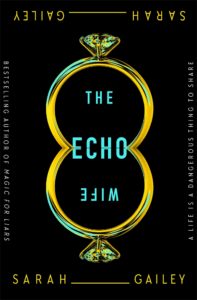
I was blown away early in 2021 when I read Sarah Gailey’s short story “STET,” and while I didn’t love the ending of Upright Women Wanted, the quality of the prose, coupled with my feelings about their short fiction, was enough to convince me to read more of Gailey’s extended work. And when The Echo Wife garnered rave reviews in my bookish social circles, it was an easy call to head down to the library to pick up a copy.
The Echo Wife takes the form of a sci-fi-infused domestic thriller, with abuse and infidelity a central theme of a compact (just 250-page!) tale of a scientist whose husband uses her own cloning technology to replace her. But despite the thriller plot underpinning the story, The Echo Wife feels just as much a character study and a reflection on abuse and personhood. And it’s a very good one.
One difficult part of writing unsympathetic leads is making the reader care what becomes of them, but Gailey has succeeded with flying colors here. The first-person narrator–the brilliant, selfish, detached scientist Evelyn Caldwell–intersperses brutally honest flashbacks into her tale, shying away from neither her own failings nor the abuses of her husband and father. And so we see her as heartless but also as damaged, as deeply selfish and callous but also as scarred by failed forays into interest in others. The reading process generally involves trying on the desires of a perspective character over the course of the read, but even with that natural tendency to sympathize with the lead, there are plenty of opportunities to step back and reject her viewpoint as toxic. But there are also plenty of times to find her plight compelling and sympathetic—Evelyn feels complex and real, for good or for ill, and her portrayal in The Echo Wife has immediately become one of my favorite studies of a largely unsympathetic central character.
But The Echo Wife isn’t just a character study. It has a robust plot that puts its characters through the wringer, and the introduction of Martine, Evelyn’s clone counterpart, provides plenty of pathos while introducing a host of questions surrounding agency, personhood, and psychological abuse. Both women are victims of a man far from a mustache-twirler, whose sins are subtle…until they aren’t anymore. The glimpses into their lives show how seemingly minor behaviors that are easy to overlook can build to something horrifying. And the entire cloning storyline provides ample examination of what it is to be a person and when it is that science crosses the line. Mind you, it doesn’t give easy answers, but there are no easy answers here, and it deftly explores all the right questions.
The biggest disappointment in the exploration of the complications of humanity and personhood is the presence of a baby that often feels pushed to the side. Fetal development provides an obvious parallel to the difficult questions about to what extent making clones is just doing some science and when it begins involving persons, and though that parallel is made during the nitty-gritty process of scientific discovery, it doesn’t receive the same kind of moral weight. And part of that is because we’re seeing the story through the eyes of a woman extremely interested in cloning and not the least bit interested in children—fair enough, we see reflections on what she cares about. But Martine’s priorities are characterized as radically different, and that doesn’t always translate the way it should. By and large, she’s a very robustly-drawn secondary character, but there’s one key instance where her actions just don’t seem to line up with what we know about her character, and it really robs the story of momentum in a moment when the novel desperately needed to maintain it.
Ultimately, a gripping narrative with an absolutely stunning unsympathetic lead and plenty of interesting reflection on heavy themes makes The Echo Wife well worthy of a read. But some inconsistency in the secondary characterization really hurts the ending, making it feel jarringly neat. Which makes it hard to score, as a book with this kind of thematic and character depth should be an easy five stars, but the mediocre last impression seems incompatible with such a rating. Forced to choose, I’ll go with my highest four-star designation, but even if it isn’t one of my highest ratings of the year, it still comes with very strong recommendation.
Recommended if you like: nuanced characters, unsympathetic leads, explorations of abuse and personhood.
Can I use it for Bingo? It’s a 2021 Publication written in First-Person, with a sci-fi/domestic-thriller Genre Mashup plot.
Overall rating: 16 of Tar Vol’s 20. Four stars on Goodreads.
